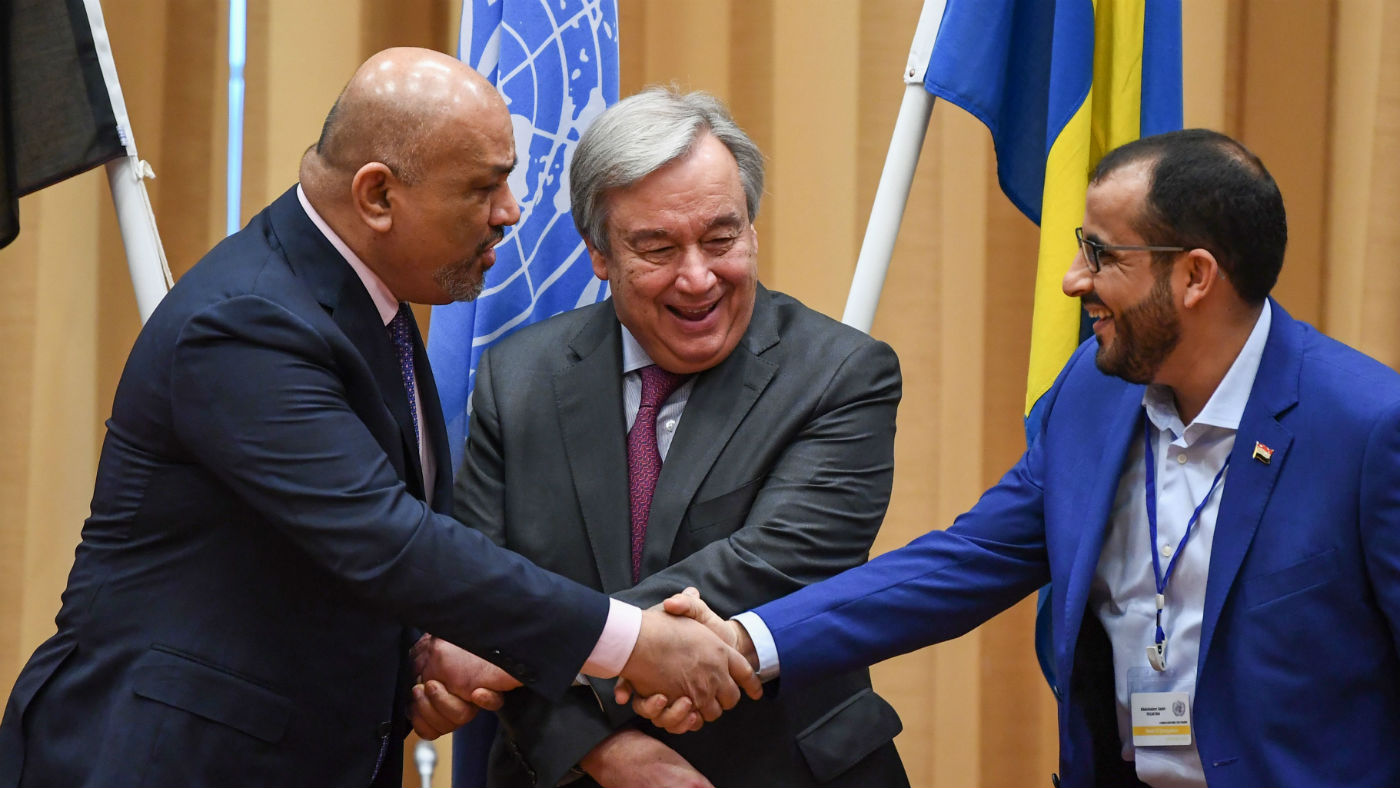Is Yemen ceasefire the first step to peace?
Agreement over disputed port raises hopes of ending ‘world’s worst humanitarian crisis’

A free daily email with the biggest news stories of the day – and the best features from TheWeek.com
You are now subscribed
Your newsletter sign-up was successful
Yemen’s warring sides have agreed a ceasefire around the flashpoint port Hudaydah, marking the first major breakthrough in peace talks for two years which could end what the UN calls the “world’s worst humanitarian crisis”.
Under the truce, brokered at landmark talks in Sweden, the Houthi rebels will withdraw their troops from the strategic western city and relinquish control of three of its ports, which serve as a major lifeline for more than 18 million Yemenis who live in rebel-held territory.
In return for a share of the port’s revenue, the Central Bank will begin paying the salaries of as many as 1.2 million government employees in Houthi-held areas who have not been paid in nearly two years. It is hoped this will lead to improvements in health, education and sanitation services which have effectively collapsed.
The Week
Escape your echo chamber. Get the facts behind the news, plus analysis from multiple perspectives.

Sign up for The Week's Free Newsletters
From our morning news briefing to a weekly Good News Newsletter, get the best of The Week delivered directly to your inbox.
From our morning news briefing to a weekly Good News Newsletter, get the best of The Week delivered directly to your inbox.
The UN special envoy for Yemen, Martin Griffiths, said that the ceasefire would also “open up the east-west road [that connects Hudaydah and Sanaa] so that a humanitarian pipeline, which is crucial to the people of Yemen, can start delivering aid”.
Announcing the agreement, United Nations Secretary General Antonio Guterres called it “an important step” and "real progress toward future talks to end the conflict."
Yemen’s foreign minister and a leader in the rival Houthi rebel group then shook hands “in a highly symbolic gesture that has raised hopes for progress on ending the nearly four-year war”, says The Independent.
“The ceasefire is also important as a confidence-building measure”, NPR’s Ruth Sherlock reports. “Like a prisoner swap announced earlier this week in talks, it's a concrete agreement that could build goodwill and lay the groundwork for more substantive peace talks in the future” says the public news organisation.
A free daily email with the biggest news stories of the day – and the best features from TheWeek.com
After four years of war between Saudi-led coalition supporting the government and Iranian-backed Houthi rebels, “the summit itself is an achievement” agrees The Economist, “but big obstacles stand in the way of last peace”.
Sources told Al Jazeera that the next round of talks, scheduled to be held in late January, “would focus on a framework for negotiations on a political process”.
Peter Salisbury, a Yemen analyst and consultant at the International Crisis Group, told the news outlet the momentum had not yet “shifted from war to peace”.
The transition could be aided by increased international pressure, which has been slowly growing following the murder of Saudi journalist Jamal Khashoggi.
The US senate voted yesterday to advance a resolution that ends US military assistance to Saudi Arabia for its war in Yemen.
The New York Times says were it to be ratified by Congress, it would amount to “another stinging, bipartisan rebuke over the Trump administration’s defence of Saudi Arabia”.
The White House has come under pressure to distance itself from Saudi Crown Prince Mohammed bin Salman in the wake of mounting evidence he was directly involved in the killing of Khashoggi in Istanbul in October.
-
 6 exquisite homes with vast acreage
6 exquisite homes with vast acreageFeature Featuring an off-the-grid contemporary home in New Mexico and lakefront farmhouse in Massachusetts
-
 Film reviews: ‘Wuthering Heights,’ ‘Good Luck, Have Fun, Don’t Die,’ and ‘Sirat’
Film reviews: ‘Wuthering Heights,’ ‘Good Luck, Have Fun, Don’t Die,’ and ‘Sirat’Feature An inconvenient love torments a would-be couple, a gonzo time traveler seeks to save humanity from AI, and a father’s desperate search goes deeply sideways
-
 Political cartoons for February 16
Political cartoons for February 16Cartoons Monday’s political cartoons include President's Day, a valentine from the Epstein files, and more
-
 Epstein files topple law CEO, roil UK government
Epstein files topple law CEO, roil UK governmentSpeed Read Peter Mandelson, Britain’s former ambassador to the US, is caught up in the scandal
-
 Iran and US prepare to meet after skirmishes
Iran and US prepare to meet after skirmishesSpeed Read The incident comes amid heightened tensions in the Middle East
-
 Israel retrieves final hostage’s body from Gaza
Israel retrieves final hostage’s body from GazaSpeed Read The 24-year-old police officer was killed during the initial Hamas attack
-
 China’s Xi targets top general in growing purge
China’s Xi targets top general in growing purgeSpeed Read Zhang Youxia is being investigated over ‘grave violations’ of the law
-
 Panama and Canada are negotiating over a crucial copper mine
Panama and Canada are negotiating over a crucial copper mineIn the Spotlight Panama is set to make a final decision on the mine this summer
-
 Why Greenland’s natural resources are nearly impossible to mine
Why Greenland’s natural resources are nearly impossible to mineThe Explainer The country’s natural landscape makes the task extremely difficult
-
 Iran cuts internet as protests escalate
Iran cuts internet as protests escalateSpeed Reada Government buildings across the country have been set on fire
-
 US nabs ‘shadow’ tanker claimed by Russia
US nabs ‘shadow’ tanker claimed by RussiaSpeed Read The ship was one of two vessels seized by the US military